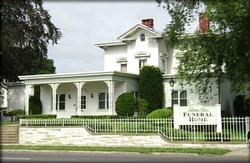Memorial Services
Unlike a traditional funeral, a memorial service is a gathering where a casket is not present (although the urn with the cremated remains may be on display). A memorial service can be held weeks or even months after the death.
A memorial service can be held in a church, the funeral home or a community hall, or somewhere of importance. There is usually music, selected readings, and a eulogy. Memorial services can be further personalized as a celebration of life.
Our experience has shown us that many of today's families want more than a traditional funeral. This can be done by bringing more of the personality and lifestyle of the deceased into the arrangements. By displaying photographs or staging the event around a favorite pastime, a memorial service can become more personal and meaningful.
Celebration of Life
Many families today want a service that celebrates the life of their loved ones. We introduce them to the concept of a celebration of life and provide support in designing a celebration of life that is as unique as the life of their loved ones. While it can be a challenge to put together an event that both pays tribute to and celebrates the life and spirit of a complex individual, it's also one of the most rewarding things any one of us can do for someone we've loved and lost.
If a personalized memorial service suits the needs of your family, we suggest you consider the following questions:
- What did your loved one like to do?
- What was he or she like as an individual?
- What was their profession and how did that shape their life?
- Was your loved one spiritual?
- Was he or she proud of their cultural or ethnic heritage?
How to Plan a Celebration of Life
It's really a process of asking–and answering–questions. Sit down with other family members, at least once—but maybe even more than once—to explore the celebration of life ideas that arise from answering these questions:
Who will be invited?
The number of guests defines the where, when, and how of your celebration of life. Write down the names of everyone you think would want to be there and then set it aside. You can add new names to the list as you go along.
Where, and when, should the event take place?
Here's where your imagination is tempered by any scheduling or travel-related issues facing those who will be invited. Be sure to check in with out-of-town relatives and friends about their situation before settling on these critical details.
Who will orchestrate or conduct the event?
If your loved one was religious, you may opt to have their pastor or church minister perform these tasks. However, many families today hire a non-denominational celebrant to oversee the celebration of life.
Who wishes to speak at the event?
Many times family members or friends will be very direct about their desire to make a short presentation at the celebration of life; other times you need to come out and ask folks if they would be willing to publicly share their thoughts and feelings. Either way, you'll want to select those people who have shared a close relationship with the deceased and have something meaningful to contribute.
What group activities would be appropriate?
We've heard some exciting celebration-of-life ideas over the years. This question involves thinking about what your loved one liked most about their life and gives everyone a remarkable space to share memories, laugh, and even cry together.
What food or beverages should be served?
What you serve may depend on the theme of your celebration of life, or may be based on your loved one's favorite dishes. It's entirely up to you; we've even seen "pot luck" celebrations of life where guests actually sign up to bring select foods and beverages.
What readings and music should you include?
Music is an integral part of life for many people, and a celebration of life is the perfect event in which to showcase the meaningful music of your loved one's life. But, if your loved one didn't appreciate music (and lots of folks don’t), it may be more appropriate to read chosen spiritual selections, or excerpts from literature.
What details of your loved one's life do you want to share with guests?
Not every biographical detail needs to be highlighted; rather you're trying to capture their essence by telling revealing anecdotes or stories. Sometimes you can reveal their character by detailing one short moment in their life experience.
What decorations will you have? Who will orchestrate or conduct the event?
Many families create a tribute video and use it as the centerpiece of the event. Others choose to use a memory table of photographs and other memorabilia instead.

(203) 335-5252
Lester Gee Funeral Home, Inc.
1390 Fairfield Ave
Bridgeport, CT 06605
Email: lestergeefh@gmail.com

